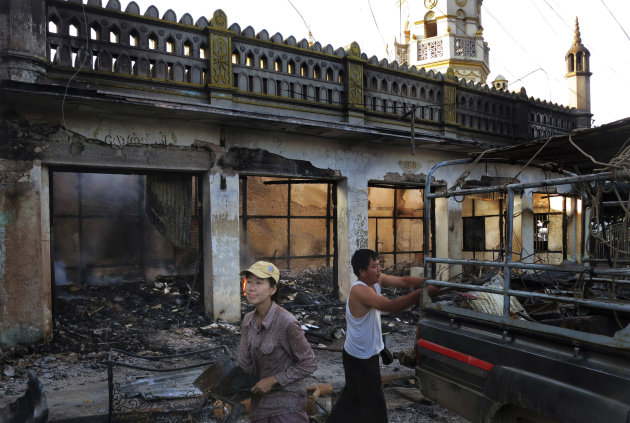
Associated Press/Todd Pitman - In this May 29, 2013 photo, Ma Sandar Soe, left, salvages goods from her burned shop in the foreground of a vandalized mosque in Lashio, northern Shan State, Myanmar. When a huge
When a huge mob of Buddhist thugs crawled on the roof of Ma Sandar Soe's shop, doused it with gasoline and set it ablaze, the Buddhist businesswoman didn't blame them for burning it to the ground despite seeing it happen with her own eyes.
Instead, her wrath was reserved for minority Muslims she accused of igniting Myanmar's latest round of sectarian unrest.
"This happened because of the Muslims," she declared, sifting through charred CDs in the ruins of her recording studio.
As Myanmar grapples with its transition to democracy, its Muslim minority is experiencing its perils in vivid, bloody fashion. Hundreds have died since last year as victims of sectarian strife.
In the country's latest round of Buddhist-Muslim violence, swarms of Buddhist men roamed Lashio's crumbling streets this week, armed with rocks and sticks and machetes. Before police and army troops stepped in, anarchic crowds had torched scores of Muslim-owned shops, sending plumes of black smoke into the sky. By the time it all ended, at least one person was dead and the town's Muslim community cowered in their homes in fear.
Ma Sandar Soe's studio fell victim because it sat in the shadow of the mob's main target — Lashio's mosque. As orange flames leapt from the ashes, she explained her rationale for pointing the finger atMuslims: The Buddhist mob was provoked by reports that a Muslim man from out of town tried to burn a Buddhist woman alive. The woman survived, badly burned, and the man was arrested.
But the roots of anti-Muslim sentiment in Myanmar, also called Burma, are far deeper and more complex than any single incident in any single town.
"There is a deep, underlying prejudice there. Even when Buddhists say they have Muslim friends, they call them 'kalar' and other derogatory terms," said Mark Farmaner of London-based Burma Campaign UK, a democracy promotion group. "That prejudice is easily exploited, and it's a cancer that is now spreading."
"Successive military regimes have implanted the dislike of Muslims in the mind of the general public and enacted ad hoc and de facto discriminatory restrictions," said Sai Latt, a doctoral candidate at Canada's Simon Fraser University who has written extensively on Muslims in Myanmar.
"There are so few sanctions now on those who provide contrarian or critical or indeed radical ideas about how society should be structured," said Nicholas Farrelly, a research fellow at Australian National University. "There is this awakening of different sentiments; some of those are very progressive and democratic, in other cases they are profoundly reactionary and or authoritarian in spirit."
Into the breach has stepped a phalanx of well-organized Buddhist monks. Aside from their religious standing, their credibility derives from historically playing a vanguard role in politics — once upon a time against British colonial rule, in more recent decades against military dictatorship.
Describing themselves as nationalists, their sermons no longer target the powerful, but instead play on deep-seated fears of the darker-skinned outsiders, Muslims of South Asian heritage who allegedly pose a threat to racial purity and national security.
Preaching all over the country, even in areas with no discernible Muslim populations, monks belonging to the radical Buddhist movement called 969 urge Buddhists to boycott Muslim businesses and not to marry, sell property to or hire Muslims. They accuse Muslims of rape, terrorism and other depredations. The group's graffiti, T-shirts and stickers are seen everywhere — including Lashio.
"Many within the government and those close to the government share anti-Muslim sentiments and fears," said Sai Latt. "Many believe 969 is only an economic nationalist movement. They don't seem to see that 969's economic nationalism is actually a crime — spreading hate messages — that is implanting hate that prompts deadly clashes."
Some suggest the anti-Muslim campaign has covert official backing, perhaps from hard-liners seeking to weaken President Thein Sein and his reform agenda.
"The violence is well-organized and appears to be a continuous campaign to spark fires across the country, creating instability, which would suggest it has the backing of political forces," said Benedict Rogers of London-based Christian Solidarity Worldwide, which promotes religious tolerance.
Muslims are not major power brokers in Myanmar, but in any given town, some strike high commercial profiles, and they are often seen by many Buddhists as members of a wealthy merchant class. One of Lashio's most prominent hotels, for example, a six-story building that sits on a hilltop, is owned by a Muslim businessman who also runs cinemas and other shops that were ransacked this week by mobs.




No comments:
Post a Comment